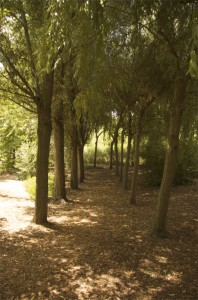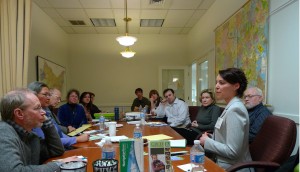 Feel like banging your head against the wall each time you try to discuss climate change with someone you know? Below is a highly valuable blog entry that was spawned from climate change concensus-building expert Larry Susskind‘s participation in a CEA/HEET-sponsored event. Here, Mr. Susskind thoroughly discusses how best to communicate with those who are critical of climate change’s legitimacy. Ultimately you must work around confrontation by facts, to get to the heart of concerns for each conversation partner. If you have been experiencing difficulty communicating with skeptics in your life, this is a blog for you.
Feel like banging your head against the wall each time you try to discuss climate change with someone you know? Below is a highly valuable blog entry that was spawned from climate change concensus-building expert Larry Susskind‘s participation in a CEA/HEET-sponsored event. Here, Mr. Susskind thoroughly discusses how best to communicate with those who are critical of climate change’s legitimacy. Ultimately you must work around confrontation by facts, to get to the heart of concerns for each conversation partner. If you have been experiencing difficulty communicating with skeptics in your life, this is a blog for you.
—
From Larry Susskind’s blog, The Consensus Building Approach:
On Wednesday, November 10th, I had an opportunity to speak to a packed room of students and community residents at Harvard College seeking advice on how to talk to climate skeptics. The premise was that students would soon be heading home for Thanksgiving. They were looking for advice on how to talk to family and friends around the holiday table who either don’t believe that global warming is happening, or accept the fact that the climate is getting warmer, but attribute relatively recent temperature changes to natural rather than man-made causes. To get things started, we heard from a local radio talk show host who really is a climate skeptic. He made it very clear that he doesn’t trust Al Gore, is sure that scientists disagree about almost everything (because that’s what science requires), and thinks that anyone who believes that climate change is the result of human activity (rather than cyclical natural phenomena) has been sold a bill of goods.
First, I tried to make clear that seeking to convert “non-believers” is probably a mistake, and is certainly no way to encourage constructive dialogue. Rather, I suggested, the goal of dialogue ought to be to share ideas, advance the cause of mutual understanding, and see what opportunities to reach agreement might exist — in spite of fundamental differences in beliefs or levels of understanding. A number of the students present found this unacceptable. From their standpoint, the threat posed by the continued build-up of greenhouse gases in the atmosphere is so frightening, they are compelled to convince anyone who doesn’t believe this to admit that they are wrong. These want to repeat and review what the vast majority of atmospheric scientists know to be true — the atmosphere is warming; this is caused by the build up of greenhouse gases, particularly CO2 and methane; this build up is caused by human activity, particularly the burning of fossil fuels; and the end result will be a worldwide catastrophy — sea level rise that will inundate vast coastal areas, particularly in the developing world; increasing storm intensification the will cause destructive flooding and Katrina-like devastation;increased drought in some areas and increasing numbers of extremely hot days that may cause massive eco-migration; more rapid spread of airborne disease, and irreversible harm to a range of marine and terrestrial species and habitats. The skeptic on the dais with me indicated that scientist can’t possibly know exactly when and where such things will and won’t happen (and he’s right). He also insisted that even if warming is occurring, it is impossible to know for sure whether it is mostly or entirely a man-made or nothing more than a natural phenomenon.
That was my cue. I said I didn’t think that mattered. I urged people interested in engaging in useful conversation with skeptics to shift their conversations to a discussion of risk — to talk about risk and risk management. I used the example of earthquakes. We don’t need to know for sure whether (where and when) an earthquake will occur to seriously consider taking action to minimize its serious adverse effects an earthquake would cause if it does occur. It turns out, we can require construction standards in new buildings that will protect people from collapsing structures. We can even retrofit existing buildings to make them more earthquake proof (although this comes at a cost). While there doesn’t seem to be anything we can do to reduce the odds of an earthquake occurring, there are lots of things we can do (including organizing and practicing emergency relief efforts) to save lives and reduce misery and reconstruction costs when earthquakes do occur. Even if the majority of scientists are right — that if we don’t reduce to 350 – 450 parts per million of CO2 equivalents in the next fifty years the worst effects of global warming will be impossible to correct, we won’t be able to reduce greenhouse gas emissions enough over the next three decades to mitigate the effects of global warming. So, given the chance that the many thousands of scientists around the world who study these issue might be right, we could look for things to do that will reduce the disastrous effects if climate change is, in fact, occurring. And, if we could find things that also serve to achieve other laudable objectives (that help almost everyone), why would anyone be opposed to that?
So, I suggested reframing the discussion around what is called adaptation. If we can switch to energy sources that don’t involve the burning of fossil fuels, but instead rely on infinite energy sources like sunlight, wind, ocean waves, biofuels and the flow of fresh water, we may be able to simultaneously reduce the adverse effects of climate change (if it does occur), decrease our country’s dependence on imported oil and gas, dramatically reduce the health dangers to human beings, minimize the ecological damage caused by air and water pollution and the degradation of surface lands, and create more jobs in our own country. This would be a “no-regrets” response to the possibility of climate change. Similarly, if we can help every household reduce the amount of electricity it wastes (especially at peak times), we can eliminate the need to build new power plants, thereby reducing everybody’s electricity rates and saving all consumers money. Even if the risks are not fully predictable, a shift to renewable energy (especially if planned in a way that compensates anyone who suffers any losses in the short term as a result of the shift), would be a more desirable way to proceed. If you think about each component of climate change risk, it should be possible to brainstorm adaptive responses that minimize the chances of serious harm to the public and to the environment while simultaneously improving the economy, and enhancing social well-being. That’s what you want to ask skeptics to think about. Ask them to join you in various “thought experiments:”
“Whatever you think the chances are that a buildup of greenhouse gases in the atmosphere is causing global temperatures to rise, and that such increases will trigger a host of dangerous and costly consequences, can we brainstorm cost-effective ways to reduce the harm that would occur if the worst happens and achieve a host of other benefits at the same time?”
Improved emergency preparedness in cities will help if flooding of the sort that occurred in New Orleans happens more often. (Increased storm intensity is one of the presumed effects of climate change.) It will also help cities whether any kind of natural or man-made emergency. Almost every city could do more at a modest cost to update and practice its emergency response procedures.
Investments in expensive transportation, wastewater treatment and other municipal infrastructure should probably be made greater consideration for the possibility of sea level rise, saltwater intrusion into fresh water marshes, and increased storm intensity. It would be crazy to be in a position of having to pay off infrastructure bonds long after a facility is no longer useable because we didn’t think twice about climate change risks. Instead, by factoring the risks associated with climate change into infrastructure planning, safer locations or new designs for new facilities might be selected.
As we think about the possibility of a lot more hot days (over 95 degrees farenheit) every summer, what improvements might we make in public and elderly housing that would help people without air conditioning survive? It should be possible to design or retrofit public housing units and to add trees and plantings to keep these units cooler. It should also possible to designate public cooling centers along with ways of helping the disabled get to these locations during a heat wave. Many lives could be saved. These are things worth figuring out regardless of whether anyone is sure that the increase in the number of hot summer days over the past decade was caused by climate change. People died in Chicago two summers ago because of what is now called “the heat island effect.”
When you getting into brainstorming sessions with skeptics, avoid asking yes or no questions. Instead ask “when, where and how” questions. How could we reduce certain risks while accomplishing other worthwhile goals? When we have the information in hand, and the public dialogue that follows could look at the full range of costs and benefits (and I don’t just mean in dollar terms) what kinds of choices might be made? People with very different views about what climate change science allows us to know might still agree on useful steps to take to reduce the risks associated with climate change because these same activities would help them achieve other things they see as important.
Don’t personalize these discussions. Focus on outcomes that would respect everyone’s principles. Talk to people you disagree with in the same way you would like to have them talk to you.
Don’t paint people into corners by saying something like: “Since science knows Fact A to be true, then you must agree that everyone ought to take Action 1.” That will just provoke a counter-attack arguing that there must be someone (somewhere on the web) who disagrees wit Fact A. Moreover, everyone who agrees that Fact A is true will not agree that only Action 1 is the logical thing to do. Instead, ask “Forget for a moment whether Fact A is true or not. What are things that people who don’t necessarily agree about Fact A would suggest are worth doing for a variety of reasons?
—





![[Tree in a rural area] (LOC) by The Library of Congress](http://farm3.static.flickr.com/2091/2179176502_90bbbc4f4c_m.jpg)




